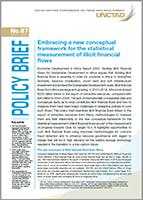
The Economic Development in Africa Report 2020: Tackling Illicit Financial Flows for Sustainable Development in Africa argues that tackling illicit financial flows is essential in order for countries in Africa to strengthen domestic resource mobilization, boost hard and soft infrastructure investment and achieve the Sustainable Development Goals.
Illicit financial flows from Africa are large and growing: in 2010-2018, Africa lost at least $220 billion linked to the export of extractive resources, compared with $40 billion in 2000-2009. The lack of internationally comparable data and conceptual clarity as to what constitutes illicit financial flows and how to measure them have been major challenges in designing policies to curb such flows.
This policy brief examines illicit financial flows linked to the export of extractive resources from Africa, methodologies to measure them and their relationship to the new conceptual framework for the statistical measurement of illicit financial flows as part of the measurement of progress towards Goal 16, target 16.4.
It highlights opportunities to curb illicit financial flows using improved methodologies for customs fraud detection and to enhance resource governance with regard to metals that will be in high demand for the battery-storage technology needed in the transition to a low-carbon future.
Key points:
-
The new conceptual framework developed by UNCTAD and the United Nations Office on Drugs and Crime can provide clarity on how to define illicit financial flows. In 2021, some countries in Africa will test the suggested methods for measuring illicit financial flows, using guidelines provided by the task force.
-
Trade in high-value, low-weight commodities, particularly gold, is an important source of illicit financial outflows from Africa. To curb such flows, countries should collect more and better trade data, close loopholes in tax treaties and strengthen regulatory frameworks.
-
New opportunities for curbing illicit financial flows can arise through the use of better methodologies for customs fraud detection and improved resource governance with regard to metals that will be in high demand for low-carbon technologies.


